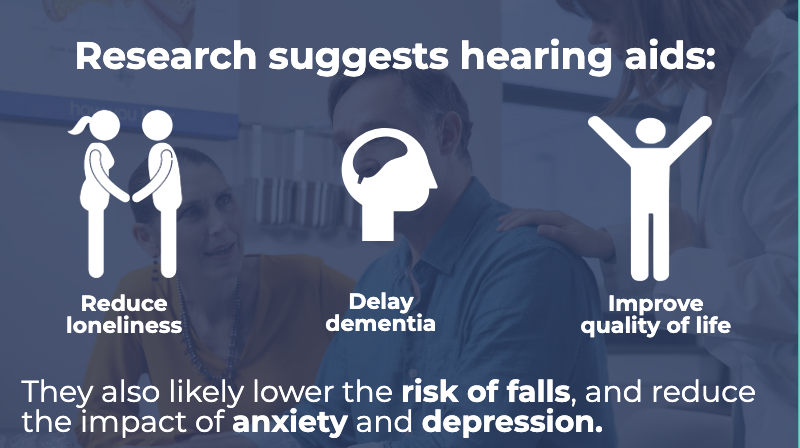[ad_1]
Contributed by Joy Victory, managing editor, Healthy Hearing
Over the past few years, as he headed into his mid-60s, Ted Tassos was starting to worry. Words didn’t make as much sense to him as they had in the past.
“I could hear people’s voices, but could make out less and less of what they were saying,” says Tassos, of New Kensington, Penn.
He wondered if this was how dementia surfaces. “I wasn’t sure if my problem was hearing loss or mental decline.”
.png)
Tassos was smart to be concerned: Hearing loss and cognitive decline are strongly linked. Many studies have found that mild cognitive impairment, dementia and Alzheimer’s disease are more common among people with hearing loss.
Researchers aren’t yet sure if hearing loss directly causes cognitive decline, but it’s quite plausible: Age-related hearing loss occurs very gradually, to the extent that many people may not even realize it. Yet at the same time, spoken language starts to sound garbled, which can be very disorienting.
As a result, people often isolate themselves socially to avoid situations where hearing is challenging and exhausting. This sets off a downward spiral in which a person disengages from the world around them. The brain is understimulated at a time when people need to stay active.
Hearing loss makes speech hard to understand
In Tassos’s case, he decided to start with a hearing test. He learned he had moderate hearing loss in the high-frequency ranges. This means that without hearing aids, it’s much harder for him to understand speech, explaining why his conversations were increasingly mystifying. Words like “sat” and “that” or “high” and “thigh” are nearly indistinguishable for a person with this type of hearing loss.
Fortunately, he was fit with hearing aids. The first few days of getting used to his hearing aids took patience, which is normal for most people, as the brain needs time to adjust.
“I noticed immediately that I was picking up more sounds of people’s voices, but not necessarily catching everything they said,” he explained. “After a few days, that improved and I was able to catch more. It was almost like a part of the auditory area of my brain was coming back online and was relearning how to sense and interpret these higher frequency sounds it was suddenly receiving.”
An exhilarating experience
Conversations started to make sense again, and Tassos started to notice how many sounds he had been missing. He felt reconnected to his surroundings.
And it was exhilarating.
“I was suddenly getting all kinds of ambient sounds around me. Birds, train whistles in the distance, insects, etc. It wasn’t a cacophony of noise though, I heard each sound clearly and distinctly,” he said. “Again, it felt like my brain was reactivating areas that had been dormant for years due to my hearing deficit.”
Hearing aids delay onset of dementia, among other benefits

People may dismiss the need for hearing birds and train whistles, yet this reconnection to the environment is important not just for brain stimulation, but also personal safety. Research bears this out: A very large 2019 study looking at data from more than 115,000 people showed that those who wore hearing aids were less likely to develop depression, cognitive problems, and falls that cause injuries compared to peers with untreated hearing loss.
That’s why medical professionals should take hearing loss in older adults seriously, explained Dr. Harvey Abrams, an audiologist with decades of experience as a researcher at both private and public organizations. “To dismiss it as a normal part of aging, that’s bordering on malpractice.”
As Tassos adapts to his hearing aids—and a more enriched life—he can’t imagine going back to a hearing-deprived life.
“[It’s] now becoming part of my ‘new normal.’ I feel more alert—and I believe I am, as I visualize more brain areas coming back online.”
[ad_2]
Source link

